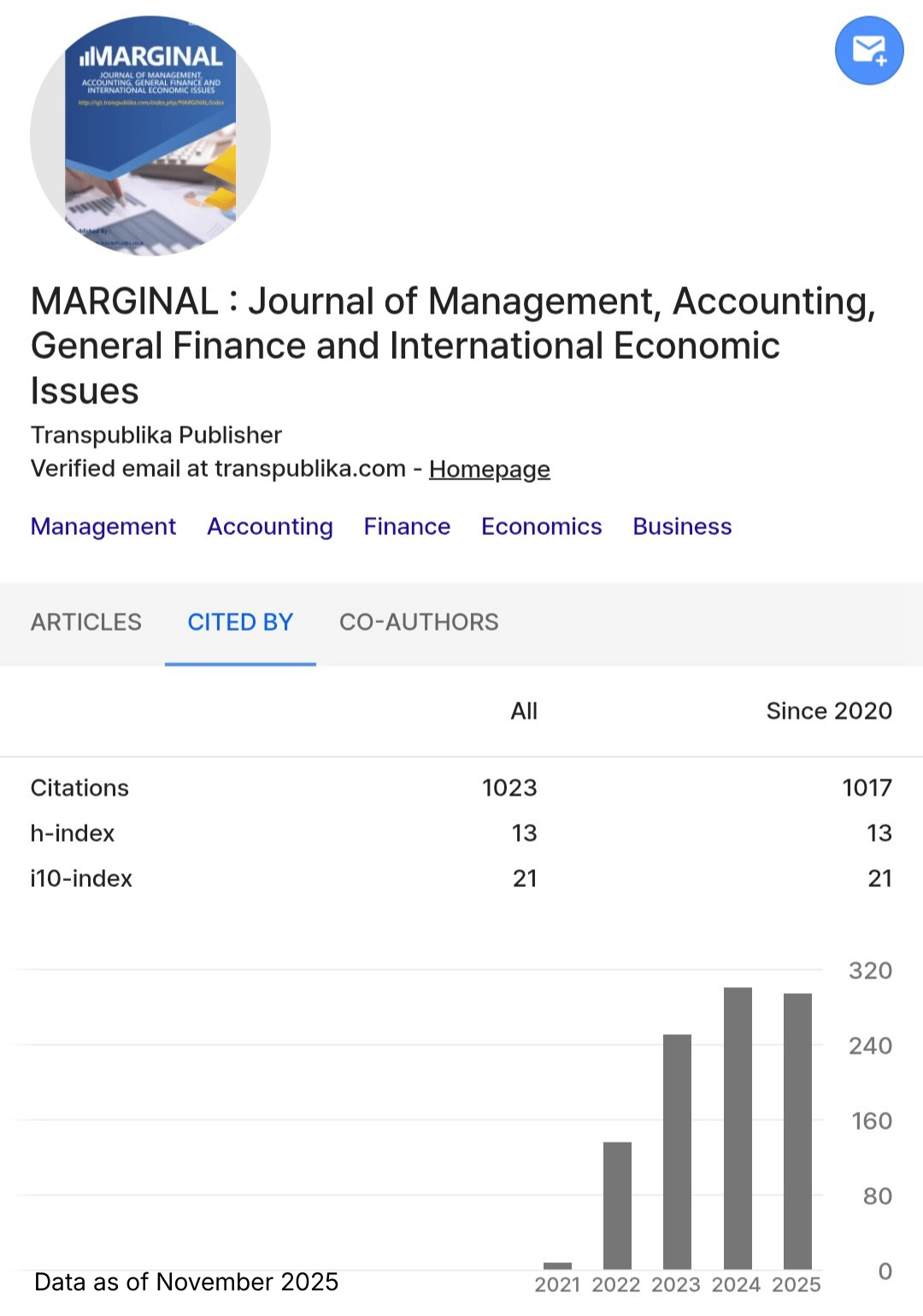THE ROLE OF ATTITUDE AND FUTURE ORIENTATION IN STIMULATING SUSTAINABLE ENTREPRENEURIAL INTENTION
Main Article Content
Filda Khoirun Nikmah
Ronald Haryanto
Sudarto
Ekaningtyas Widiastuti
During a period of fast economic expansion and worldwide environmental issues, an increasing number of business owners are incorporating sustainable practices in order to make sure their companies contribute positively to society and safeguard the environment. This research investigates how the consideration of future consequences, attitude, and perceived behavioral control impact the intention to become an entrepreneur among students at Universitas Jenderal Soedirman. A total of 77 participants completed a questionnaire to provide data for the study. The results of the research suggest that the consideration of future consequences does not influence entrepreneurial intention. However, Sustainable Entrepreneurial Intention is positively impacted by Attitude and Perceived Behavioral Control. This study provides implications for students to get support in increasing their confidence in running a sustainable business, campuses as educational institutions to develop business incubation programs that focus on sustainable entrepreneurship, and the government can design policies that support positive attitudes towards sustainable entrepreneurship among young people, such as incentives and training.
Ajzen, I. (1991). The theory of planned behavior. Organizational Behavior and Human Decision Processes, 50(2), 179–211.
Arnocky, S., Milfont, T. L., & Nicol, J. R. (2014). Time perspective and sustainable behavior: Evidence for the distinction between consideration of immediate and future consequences. Environment and Behavior, 46(5), 556–582.
Cabral, C., & Jabbour, C. J. C. (2020). Understanding the human side of green hospitality management. International Journal of Hospitality Management, 88, 102389.
Ena, G. W. W., & Huib, I. T. S. (2024). Decoding Agripreneurship: Understanding the Factors that Shape Entrepreneurial Intentions in Agriculture Using the Theory of Behavioural Control. Journal of Agribusiness, 12(1), 72–82.
Gul, S., Anjum, M. N., & Bajwa, M. A. (2023). Role of Perceived Behavioral Control, Perceived Trust and Entrepreneurial Intentions in Crowdfunding Intentions. Contemporary Issues in Social Sciences and Management Practices, 2(4), 340–354.
Krueger Jr, N. F., Reilly, M. D., & Carsrud, A. L. (2000). Competing models of entrepreneurial intentions. Journal of Business Venturing, 15(5–6), 411–432.
Kuckertz, A., & Wagner, M. (2010). The influence of sustainability orientation on entrepreneurial intentions—Investigating the role of business experience. Journal of Business Venturing, 25(5), 524–539.
Mettan, S. V., & Rahmawati, V. (2024). Relationship of attitude towards entrepreneurship to entrepreneurial intention through entrepreneurship education (case study of high school students in surabaya). Research In Management and Accounting (RIMA), 7(1), 1–19.
Patzelt, H., & Shepherd, D. A. (2011). Recognizing opportunities for sustainable development. Entrepreneurship Theory and Practice, 35(4), 631–652.
Shepherd, D. A., & Patzelt, H. (2011). The new field of sustainable entrepreneurship: Studying entrepreneurial action linking “what is to be sustained” with “what is to be developed.” Entrepreneurship Theory and Practice, 35(1), 137–163.
Simamora, A. L., & Sulistyo, A. P. (2023). The Role of Perceived Behavior Control in Mediating Entrepreneurship Education and Entrepreneurial Intention. The Role of Perceived Behavior Control in Mediating Entrepreneurship Education and Entrepreneurial Intention., 2(12), 675–681.
Singh, S. K., Pradhan, R. K., Panigrahy, N. P., & Jena, L. K. (2019). Self-efficacy and workplace well-being: moderating role of sustainability practices. Benchmarking: An International Journal, 26(6), 1692–1708.
Srivastava, A., Gautam, V., & Sharma, V. (2023). Does consideration for future consequences matter in consumer decision to rent electric vehicles? Energy Policy, 181, 113726.
Talukder, S. C., Lakner, Z., & Temesi, Á. (2024). Interplay of Influencing Factors Shaping Entrepreneurial Intention: Evidence from Bangladesh. Administrative Sciences, 14(7), 136.
Thelken, H. N., & de Jong, G. (2020). The impact of values and future orientation on intention formation within sustainable entrepreneurship. Journal of Cleaner Production, 266, 122052.
Tsaknis, P. A., & Sahinidis, A. G. (2024). Do personality traits affect entrepreneurial intention? The mediating role of the theory of planned behavior. Development and Learning in Organizations: An International Journal.
Tulipa, D., Sancoko, A. H., & Rahmawati, V. (2024). Peran perceived desirability dalam memediasi hubungan antara attitude dengan entrepreneurial intention. Media Mahardhika, 22(3), 365–376.
Vu, T. D., Vu, P. T., Hoang, C. C., Nguyen, T. P. L., & Nguyen, T. H. (2024). The key determinants affecting entrepreneurial intention of student: Integrating theory of planned behaviour and perceived university support. Journal of Infrastructure, Policy and Development, 8(7), 4655.
Vuorio, A. M., Puumalainen, K., & Fellnhofer, K. (2018). Drivers of entrepreneurial intentions in sustainable entrepreneurship. International Journal of Entrepreneurial Behavior & Research, 24(2), 359–381.
Yasir, N., Mahmood, N., Mehmood, H. S., Babar, M., Irfan, M., & Liren, A. (2021). Impact of environmental, social values and the consideration of future consequences for the development of a sustainable entrepreneurial intention. Sustainability, 13(5), 2648.




















